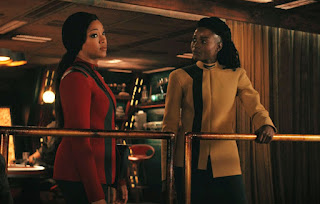To reach the location of the mysterious "10-C" aliens, Discovery must pass through the dangerous barrier at the edge of the galaxy. Meanwhile, Tarka and Book are making their own preparations to cross the barrier, which require Tarka to confront his past.
For fans of the original Star Trek series, the "galactic barrier" is a concept that looms large. It didn't come from just any episode, but from the first episode ever made with most of the familiar cast (after the original, discarded pilot). For casual fans, it surely means nothing. For those who know the old episodes, it's the place where one or two people on your crew are going to threaten your ship after they develop telekinetic powers and god complexes.
To me, that feels like too foundational a thing to just ignore. It's a thing you'd imagine the writers specifically wanted to grapple with; otherwise, they'd have just placed these mysteries new aliens in some "unexplored part of the galaxy" rather than specifically outside of it. It's why they'd have devoted an entire episode to "The Galactic Barrier," right? But no, they did indeed ignore all that, leaving fans to infer that this all-important "shielding" they kept talking about was also a barrier against corrupting "ESP" powers. (I guess, at least, Discovery and her crew do come from a time before any of that happened to Kirk and the Enterprise. They just didn't know. And apparently no one thought to warn them?)
Part of me acknowledges that all of that is a pretty silly and minute thing to get hung up on. "You're not respecting continuity from 56 years ago!" is, on the face of it, a fairly stupid complaint. But I really could not let go of it as I watched Discovery go on a "Fantastic Voyage" that involved entering "cells" and going through color timing shifts. None of it felt remotely as interesting as what that provocative episode title primed a Trekker like me to expect.
Most of the rest of the episode fell flat for me too. Tarka's backstory, meant to humanize him, felt oddly insufficient. It seems that his deep yearning to reunite with an old friend is exactly that, nothing more than a desire to atone for a betrayal. And sure, people can be illogical and contradictory, but with all the subsequent betrayals Tarka has committed over the last few episodes, it really seemed to me that something more profound was needed in his backstory to justify his behavior. I guess for Tarka, two wrongs (or five, or thirty) really do make a right.
The overall stakes of the season have reached cartoonish heights. The entire galaxy was already threatened (and not for the first time on Discovery); specifically threatening Earth and Ni'Var felt unnecessary to me. (I only hope it means there's nowhere to go but to a more muted "season-long plot" for season five.) And while I absolutely love Sonequa Martin-Green's performance on this series (and she is the star of the show), I think it's OK for them to let Burnham have more moments of weakness. This week, she was essentially teaching President Rillak how to President, in an incredibly awkward bit of "Captainsplaining."
There were a few enjoyable moments for me. I continue to love the slow burn romance between Saru and T'Rina. Saru confessing his feelings with the expectations he'd never see T'Rina again, only to then... have to see her again? Marvelously awkward. Adira as the embarrassed kid rolling eyes at the proud parent was a fun scene. (Though I wish Tilly had returned more than Adira.) And I loved the small moment of the bridge crew all sharing their dream Earth vacations; those are the sorts of little details I've been wishing for all along, to gradually flesh out the side characters rather than dropping convenient backstories onto them when the plot demands it.
But overall? Another pretty weak episode for the season in my view. I feel a bit generous in giving it a C+. But the good news (I think) is that with only three more episodes in the season, there can't be too much more marking time like this before we get to the big, impactful events that wrap up the story.


















